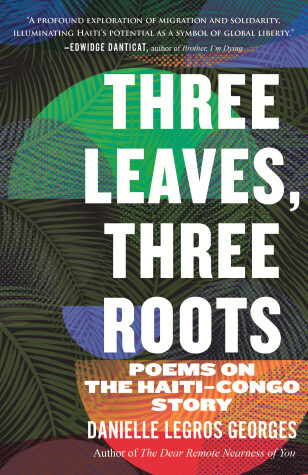Raised Voices
1 total work
A Haitian-born, Boston-based poet explores the personal and political stories of the Haitians who were part of Congo’s 1960s decolonization movement
Between 1960 and 1975, thousands of Haitian professionals emigrated to Congo, a fellow Black francophone nation that emerged under the revolutionary new leadership of Patrice Lumumba. As Danielle Legros Georges writes in the introduction to this collection, these émigrés sought to “escape repression in Haiti, start new lives in Africa, and participate in a decolonizing Congo.” Among them were her parents.
Grounded in these personal and social histories, Three Leaves, Three Roots is a collection of Legros Georges’s creative reconstructions of the Haiti-Congo experience. She interweaves her verses with excerpts from primary sources such as the interviews she conducted with the Congo émigrés and letters written by people both famous and obscure, including Lumumba, Fidel Castro, and members of Legros Georges’s family.
The result is a richly layered portrayal of an era of decolonization and rebuilding, a time that sparked with both promise and vulnerability for the Pan-Africanist and Black Power movements. This collection is an important work of Haitian American poetry and of Black history: it reminds us, artfully, that movements of solidarity among people of color have always existed and always will exist.
Between 1960 and 1975, thousands of Haitian professionals emigrated to Congo, a fellow Black francophone nation that emerged under the revolutionary new leadership of Patrice Lumumba. As Danielle Legros Georges writes in the introduction to this collection, these émigrés sought to “escape repression in Haiti, start new lives in Africa, and participate in a decolonizing Congo.” Among them were her parents.
Grounded in these personal and social histories, Three Leaves, Three Roots is a collection of Legros Georges’s creative reconstructions of the Haiti-Congo experience. She interweaves her verses with excerpts from primary sources such as the interviews she conducted with the Congo émigrés and letters written by people both famous and obscure, including Lumumba, Fidel Castro, and members of Legros Georges’s family.
The result is a richly layered portrayal of an era of decolonization and rebuilding, a time that sparked with both promise and vulnerability for the Pan-Africanist and Black Power movements. This collection is an important work of Haitian American poetry and of Black history: it reminds us, artfully, that movements of solidarity among people of color have always existed and always will exist.
